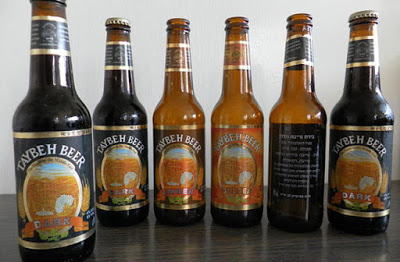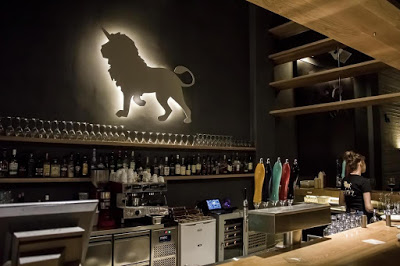in Israeli society. A bar putting on a Palestinian
beer in Haifa, one of the few mixed cities in Israel, is the subject of a Boycott
because it’s subsidising the ‘enemy’ and it is like ‘drinking Jewish blood’
(the old blood libel resurfaces with a vengeance).
faithful Tory/New Labour supporters echo, that Boycott=Anti-Semitism and these
disgusting racist hypocrites never once tell us about the real Boycott – the Boycott
of Palestinians by Israel.
An Israeli Bar Put a Palestinian Beer on Tap. Then the Depressingly
Expected Happened
Brewpub in lower Haifa, in northern Israel, February 2017.
 |
| The Jewish owners of the Libira Brewpub, located in downtown Haifa, faced an online hate campaign after it stocked alcohol from a Palestinian brewery in the West Bank. Libira Brewery |
to give their customers a chance to sample a Palestinian beer from the
Shepherds Brewery in Ramallah, and made it available for a month. They never
imagined that it would become a political hot potato and evoke angry reactions.
Indeed, for the past week, there has been a growing number of calls online to
boycott their establishment completely.
beer made from Jewish blood!!!” one person wrote in a post, going on to curse
the owners and call for a boycott of the pub. Other comments included “All
proceeds go to terrorism,” and, “Let me know when you stop selling this beer so
I’ll think about coming back.”
 |
| Palestinian- and Israeli-made beer at Libira Brewpub in Haifa. “Whoever sells beer from the PA should be boycotted by Israel,” wrote one commenter. Courtesy Libira Brewpub |
Lipkin, one of the three owners of Libira, which is located on Hanamal Street
and open daily. “One was a post about how
we we’re going to host beers from the Shepherds Brewery in Ramallah, and the
second was a post we shared from that brewery – about the beer festival they
were having in Ramallah. I just left it as was, without getting into any
politics.”
the Haifa bar, explains Lipkin, whether it’s beer from the West Bank, or the
Judean Hills in Israel, or abroad. It’s all part of the open approach he
developed when running an earlier incarnation of Libira, which also went by
that name.
would be nice, as part of the concept of the place, for us to offer a changing
selection of beers from other breweries. It’s also interesting to taste a
different beer each time, and I thought this was important, too. And so natural
– a good way to get to know the surroundings. The same kind of thing can happen
with food from different places, through getting to know other people’s culture
and customs, as well as by means of the beer they make. It’s all part of the
same picture.
 |
| Angry social media backlash and calls for a boycott followed the sale of Ramallah-made brew at a pub in Haifa. But the owners remain steadfast. |
question that we would continue the tradition of featuring a selection of beers
from guest breweries, and we did so from the start. In addition to our own five
beers, we always offered different varieties from other breweries in Israel and
abroad.”
breweries like Srigim in the Elah Valley, southwest of Jerusalem; Dancing Camel
in Tel Aviv; BrewDog in Scotland (“a real role model”); and beers from the
Taybeh and Shepherds breweries, “which
both happen to be in what’s known as ‘the territories’ or ‘Palestine’ or the
‘Palestinian Authority,’” as he puts it.
drink beer produced by the Taybeh Brewing Company – though he says he has had a
long personal connection with its owners. Taybeh is a predominantly Christian
village located northeast of Ramallah, and its brewery hosts an annual
Oktoberfest event.
– they’re both breweries of our neighbors, and if they make good beer, I don’t
see what the problem is with drinking it. In fact, I think we should all have a
natural interest in the people around us, especially in Haifa, with its mixed
population of Jews and Arabs,” Lipkin continues. “As far as these
breweries in the PA territory are concerned, it’s kind of sad, without getting
into politics. Because who makes beer? The Christians. And one can imagine that
they’re sort of stuck between a rock and a hard place.”
territories should be the target of so much criticism, he adds: “It seems so
natural and obvious to me to want to know one’s neighbors, that it shouldn’t
even need an explanation. And yes, the same goes for here, when some of the
neighbors are Arabs.”
about offering Shepherds’ beer, Palestinians are apparently enemies, first and
foremost.
the lowest of the low!” ranted one. “Keep on supporting Palestine,” protested
another. “Whoever sells beer from the PA should be boycotted by Israel,”
wrote another.
sure to give the brewery a one-star (out of five) rating, and added a (Hebrew)
tag: “Boycott Libira.” The pub’s
status began to be affected.
(“Even though the racist and inciting comments are still trickling in”).
pleasant and of course I reported [the ratings] to Facebook,” he says. “But
only about those who I knew for certain gave the pub a low rating just because
of the recent events and not because they had a bad experience there. Still,
I’d like to maintain an objective rating.”
“It’s easy to tell, and not just because of the timing, but because the
comments posted with these recent ratings directly indicated it – you can see
the prejudice. They’re full of incitement and racism or, in the best case, pure
rubbish. When you see something like, ‘We won’t drink beer that’s made from the
blood of Jews’ – come on! And you know what? If we get less customers who think
like that, we won’t really be sorry – the air in the place will be fresher,”
says Lipkin, barely pausing for air himself.
our customers at Libira, but we don’t need everyone to come here. And the
customers that we do want? They won’t let such reactions affect them, so we’ll
keep on doing things the way we want to.”
on American market
08:02
Palestinian territories, has become a shining success story out of the small
Christian village where the brewery operates in the West Bank.
Started after the Oslo Accords in the mid 1990s by the Khoury family,
Taybeh Brewing Company began in the optimistic time when it looked like Palestinians
and Israelis would soon find a solution to their ongoing conflict.
While the hoped-for solution proved elusive, Taybeh beer
has kept on brewing, carving out a market for itself even in quite challenging
business circumstances.
Says Nadim Khoury, co- founder and master brewer at the
Taybeh Brewing Company, “Well, I want to make something for my homeland, for
Palestine. I’m a risk-taker, I’m an entrepreneur. I believe I just want to do
something different than any others in Palestine.”
The beer is a proudly local product. Its name,
“Taybeh,” which means delicious in Arabic, is also the name of the
brewing location. Crushed barley from the brewing process is given to local
farmers who feed it to their livestock.
The brewery, which can produce 4,000 bottles per hour,
plays a role in the local economy and Taybeh beer has made the village more
well-known.
Since 2005, Taybeh has been holding an Oktoberfest each
year, bringing scores of visitors from across the West Bank, Israel and abroad to this small, but welcoming locale.
“Taybeh beer became
the famous number one product in Palestine,” says Khoury.
“Palestinians have lost their nationalistic feeling for so many years
because we’ve been under the wars, under occupation, and now they are proudly
serving Taybeh beer in bars and we create a good market in Palestine.”
Beyond its local role, Taybeh is also making a mark
globally. The Japanese have developed a taste for the beer and it is also
brewed under license in Germany.
Taybeh is produced with equipment that had to be imported
from all around the world, but the beer retains a local flavor. Master brewer
Nadim Khoury, an engineer by training, fixes all the machinery himself and his
signature appears on every bottle of Taybeh.
According to co-owner Madees Khoury, “People all over the
world don’t know that Palestinians maybe drink beer or drink alcohol or produce
high-quality products. Our beer made Taybeh famous and people now know the name
Taybeh, know the beer, know the town. It’s internationally recognized; it’s
sold internationally. It’s a high quality product.”
From this village of 2,000 nestled in the West Bank, Taybeh
beer has made a name for itself in the West Bank and in Israel, and has now set
its sights on the American market.